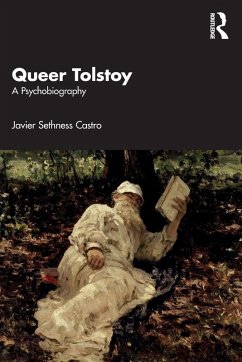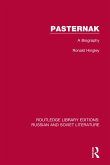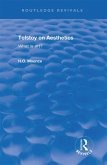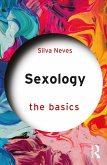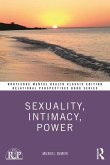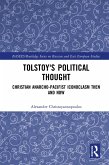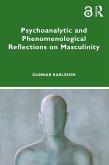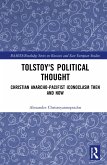Queer Tolstoy is a multidimensional work combining psychoanalysis, political history, LGBTQ+ studies, sexology, ethics, and theology to explore the life and art of Count Lev Nikolaevich Tolstoy.
Using a psychobiographical framework, Sethness Castro uncovers profoundly queer dimensions in Tolstoy's life experiences and art. Deftly contributing to the progressive and radical analysis of gender and sexuality, this book examines how Tolstoy's erotic dissidence informed his anarchist politics, anti-militarist ideals, and voluminous literary production. Sethness Castro analyzes the influence of Buddha, Socrates, Jesus, Cervantes, Rousseau, Kant, Herzen, Proudhon, Chernyshevsky, and his mother Marya Volkonskaya on the artist's writings. Furthermore, he details Tolstoy's emblematic linking of LGBTQ+ desire with moral and erotic self-determination and resistance to Tsarist despotism-especially in War and Peace.
This book is vital reading for those interested in the intersection of literature, psychoanalysis, queer studies, and Russian history.
Chapter 2 of this book is available for free in PDF format as Open Access from the individual product page at www.taylorfrancis.com. It has been made available under a Creative Commons Attribution-NonCommercial 4.0 International license.
Using a psychobiographical framework, Sethness Castro uncovers profoundly queer dimensions in Tolstoy's life experiences and art. Deftly contributing to the progressive and radical analysis of gender and sexuality, this book examines how Tolstoy's erotic dissidence informed his anarchist politics, anti-militarist ideals, and voluminous literary production. Sethness Castro analyzes the influence of Buddha, Socrates, Jesus, Cervantes, Rousseau, Kant, Herzen, Proudhon, Chernyshevsky, and his mother Marya Volkonskaya on the artist's writings. Furthermore, he details Tolstoy's emblematic linking of LGBTQ+ desire with moral and erotic self-determination and resistance to Tsarist despotism-especially in War and Peace.
This book is vital reading for those interested in the intersection of literature, psychoanalysis, queer studies, and Russian history.
Chapter 2 of this book is available for free in PDF format as Open Access from the individual product page at www.taylorfrancis.com. It has been made available under a Creative Commons Attribution-NonCommercial 4.0 International license.
'Sethness's excellent book is a wide-ranging and erudite examination of Tolstoy through the lenses of queerness and anarchism, and what is remarkable is how many contradictions and mysteries in Tolstoy's life and work get clarified by this double focus. It is as if he had suddenly popped into three dimensions. The close reading of War and Peace is full of startling new insights, and the study as a whole brings Tolstoy into our time in a new and important way. Wonderful to see!'
Kim Stanley Robinson, author of The Ministry for the Future, USA
'This passionate, ground breaking study of Tolstoy's bisexuality, politics and art offers fascinating new insights into our understanding of the Russian writer's life. By detailing Tolstoy's relationships, experiences and creative process, the author reveals Tolstoy's far sighted literary support for what we would now call LGBT+ liberation, his resistance to war and oppression, and his support for egalitarian social change. Bravo!'
Peter Tatchell, human rights campaigner and Director, Peter Tatchell Foundation, UK
'Queer Tolstoy is astonishing in the breadth of its expert knowledge base as well as its vibrant insights on timely questions of gender and sexuality. It's a tour de force featuring dazzling literary analysis, political critique, close reading of texts, plus fulsome biographical and historical context. Sethness Castro explicates War and Peace as a Russian Iliad, whose themes are vividly contemporary: horrors of war, anti-militarism, anti-imperialism, class hierarchy, labor exploitation, humanism, self-sacrifice, religious pacifism, and collective liberation. Viewing Tolstoy as a 'traumatized veteran and a queer outsider,' Sethness Castro furnishes a new philosophical understanding of underappreciated homosocial, homophilic, and homosexual aspects of Tolstoy's life and works as these illumine bonds of friendship, love, and peace, and issues of misogyny, super-masculinity, and patriarchal despotism. References are memorable not only to Marx, Marcuse, Kropotkin, and the great names of 19th Century Russian and European literature, but also to rather more unlikely (yet equally momentous) connections to Ali Shariati, Gandhi, Leslie Fiedler, and Malcolm X, with even a note on Tolstoy's acquaintanceship with the vegetarian founder of a Russian commune near Wichita, Kansas! This landmark new appreciation of the life and work of Tolstoy develops an intimate and uplifting sense of solidarity with the monumental prose poet as dissident literary artist, pacifist, and educator, who transgressed conventional gender boundaries.'
Charles Reitz, author of The Revolutionary Ecological Legacy of Herbert Marcuse, USA
'Javier Sethness Castro's book is quite remarkable. Not only does he tell us much about Tolstoy, the brilliant author and Russian count, but he does so through a contemporary lens that has no parallel. I usually don't like ways of seeing that compare historical events through the eyes of today's world. I usually find such attempts artificial, trying to be politically correct. But Sethness's ideas are much more than that. Using a wealth of contemporary and historical sources, we find a provocative argument that deserves consideration. Was Tolstoy "queer"? We will never know for sure, but Sethness makes a compelling case. His book is provocative, engaging and well written. I might never have known all that I learned from it; I am glad I read it, and think it is a worthy addition to your library. How often do you find an anarchist, Christian, gender-stretching author who we really knew so little about?'
Elaine Leeder, Dean Emerita/Professor Emerita, Sonoma State University, USA
'Queer Tolstoy makes a bold contribution to scholarship and should appeal to multiple audiences within and beyond Russian, Eastern European, and Eurasian studies. Tolstoy specialists, scholars of Russian literature and empire, and those invested in Russian queer culture and thought will find a refreshingly new vision of Tolstoy in this clearly argued, widely researched, and thought-provoking monograph [...].
Analyzing Tolstoy's life and works in relation to Russia and European anarchist, populist, socialist, feminist, psychoanalytic, and sexological thought, as well as both Christian and Buddhist theology, Sethness argues that Tolstoy was a bisexual whose queer desires for men were inextricably linked to his critique of not only the Russian state and church, but also repressive social hierarchies, imperialism, war, abuse of animals, and other manifestations of 'toxic masculinity' [...].
His ideal readers will delight in the rhetorical acrobatics that allow them to see Mikhail Kuzmin's Wings (1906) and even-through a wink at Arkhip Kuindzhi's painting, Rainbow (1905)-gay pride flags avant-la-lettre in Prince Andrei's sky. They will also relish the rare invitation this volume offers to contemplate Tolstoy alongside such thinkers as Audre Lorde, Gayle Rubin, and Ursula Le Guin. While acknowledging Tolstoy's misogyny, Russian chauvinism, and commitment to aristocratic leadership of the narod [people] as major limitations to his egalitarianism, Sethness marshals a broad spectrum of progressive thought in his analysis of these contradictions [...].
Given the importance of any work that counters the harmful suppression of LGBTQ+ voices and histories in Russia, Queer Tolstoy should be greeted as a welcome incursion on the discipline by a writer who rightfully claims Tolstoy for world culture.'
Jillian Porter, New York University, USA
Kim Stanley Robinson, author of The Ministry for the Future, USA
'This passionate, ground breaking study of Tolstoy's bisexuality, politics and art offers fascinating new insights into our understanding of the Russian writer's life. By detailing Tolstoy's relationships, experiences and creative process, the author reveals Tolstoy's far sighted literary support for what we would now call LGBT+ liberation, his resistance to war and oppression, and his support for egalitarian social change. Bravo!'
Peter Tatchell, human rights campaigner and Director, Peter Tatchell Foundation, UK
'Queer Tolstoy is astonishing in the breadth of its expert knowledge base as well as its vibrant insights on timely questions of gender and sexuality. It's a tour de force featuring dazzling literary analysis, political critique, close reading of texts, plus fulsome biographical and historical context. Sethness Castro explicates War and Peace as a Russian Iliad, whose themes are vividly contemporary: horrors of war, anti-militarism, anti-imperialism, class hierarchy, labor exploitation, humanism, self-sacrifice, religious pacifism, and collective liberation. Viewing Tolstoy as a 'traumatized veteran and a queer outsider,' Sethness Castro furnishes a new philosophical understanding of underappreciated homosocial, homophilic, and homosexual aspects of Tolstoy's life and works as these illumine bonds of friendship, love, and peace, and issues of misogyny, super-masculinity, and patriarchal despotism. References are memorable not only to Marx, Marcuse, Kropotkin, and the great names of 19th Century Russian and European literature, but also to rather more unlikely (yet equally momentous) connections to Ali Shariati, Gandhi, Leslie Fiedler, and Malcolm X, with even a note on Tolstoy's acquaintanceship with the vegetarian founder of a Russian commune near Wichita, Kansas! This landmark new appreciation of the life and work of Tolstoy develops an intimate and uplifting sense of solidarity with the monumental prose poet as dissident literary artist, pacifist, and educator, who transgressed conventional gender boundaries.'
Charles Reitz, author of The Revolutionary Ecological Legacy of Herbert Marcuse, USA
'Javier Sethness Castro's book is quite remarkable. Not only does he tell us much about Tolstoy, the brilliant author and Russian count, but he does so through a contemporary lens that has no parallel. I usually don't like ways of seeing that compare historical events through the eyes of today's world. I usually find such attempts artificial, trying to be politically correct. But Sethness's ideas are much more than that. Using a wealth of contemporary and historical sources, we find a provocative argument that deserves consideration. Was Tolstoy "queer"? We will never know for sure, but Sethness makes a compelling case. His book is provocative, engaging and well written. I might never have known all that I learned from it; I am glad I read it, and think it is a worthy addition to your library. How often do you find an anarchist, Christian, gender-stretching author who we really knew so little about?'
Elaine Leeder, Dean Emerita/Professor Emerita, Sonoma State University, USA
'Queer Tolstoy makes a bold contribution to scholarship and should appeal to multiple audiences within and beyond Russian, Eastern European, and Eurasian studies. Tolstoy specialists, scholars of Russian literature and empire, and those invested in Russian queer culture and thought will find a refreshingly new vision of Tolstoy in this clearly argued, widely researched, and thought-provoking monograph [...].
Analyzing Tolstoy's life and works in relation to Russia and European anarchist, populist, socialist, feminist, psychoanalytic, and sexological thought, as well as both Christian and Buddhist theology, Sethness argues that Tolstoy was a bisexual whose queer desires for men were inextricably linked to his critique of not only the Russian state and church, but also repressive social hierarchies, imperialism, war, abuse of animals, and other manifestations of 'toxic masculinity' [...].
His ideal readers will delight in the rhetorical acrobatics that allow them to see Mikhail Kuzmin's Wings (1906) and even-through a wink at Arkhip Kuindzhi's painting, Rainbow (1905)-gay pride flags avant-la-lettre in Prince Andrei's sky. They will also relish the rare invitation this volume offers to contemplate Tolstoy alongside such thinkers as Audre Lorde, Gayle Rubin, and Ursula Le Guin. While acknowledging Tolstoy's misogyny, Russian chauvinism, and commitment to aristocratic leadership of the narod [people] as major limitations to his egalitarianism, Sethness marshals a broad spectrum of progressive thought in his analysis of these contradictions [...].
Given the importance of any work that counters the harmful suppression of LGBTQ+ voices and histories in Russia, Queer Tolstoy should be greeted as a welcome incursion on the discipline by a writer who rightfully claims Tolstoy for world culture.'
Jillian Porter, New York University, USA

